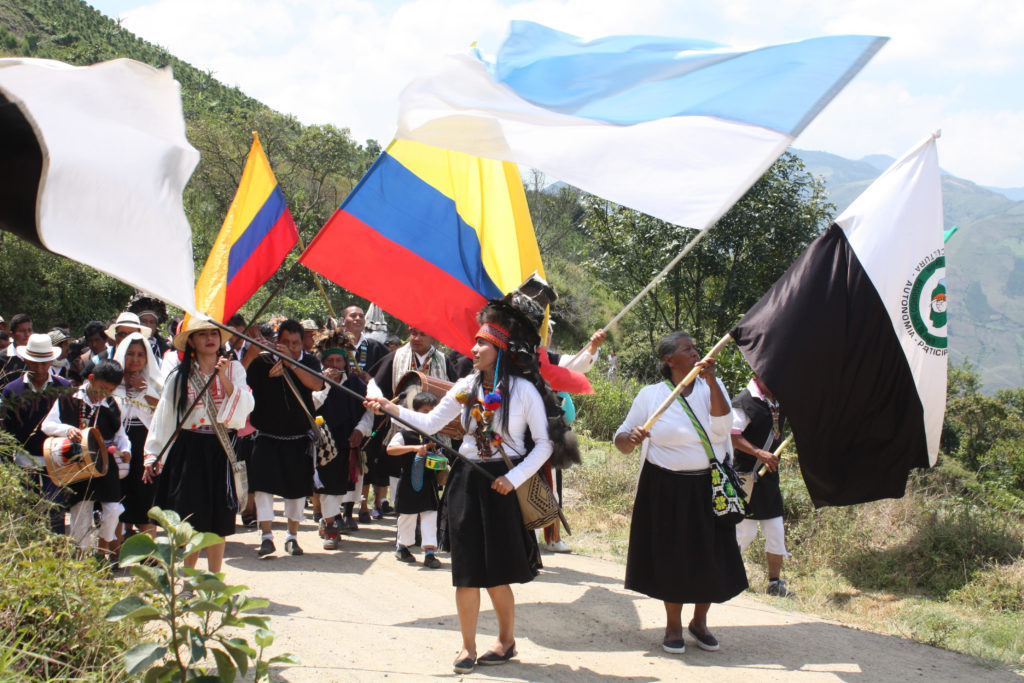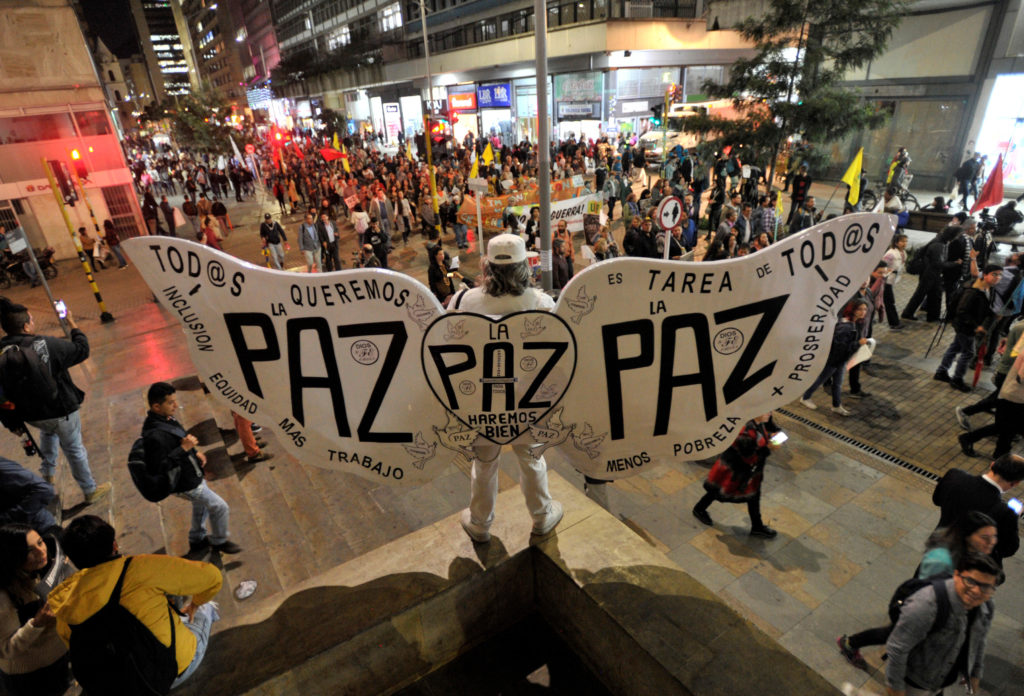Javier Ciurlizza es actualmente el director de la Fundación Ford para la Región Andina. Antes de incorporarse a la Fundación Ford en 2016, fue director de programas para América Latina y el Caribe del International Crisis Group. Dirigió iniciativas para abordar conflictos armados, sociales y políticos en Bolivia, Colombia, Ecuador, Guatemala, México, Venezuela y Haití. Anteriormente, trabajó como director para las Américas del Centro Internacional para la Justicia Transicional.
Javier fue secretario ejecutivo de la Comisión de la Verdad y Reconciliación de Perú y director del Instituto de Democracia y Derechos Humanos de la Pontificia Universidad Católica del Perú. Fue nombrado jefe de gabinete del Ministerio de Justicia de Perú y asesor especial del Ministerio de Relaciones Exteriores. También asesoró procesos de comisiones de la verdad y de reparación a víctimas en Paraguay, Kenia, Indonesia y Liberia. Comenzó su carrera profesional estrechamente vinculado al movimiento de derechos humanos peruano, como asistente del secretario ejecutivo del Coordinadora de Derechos Humanos y, posteriormente, como secretario general de la Comisión Andina de Juristas.
Javier tiene una maestría en economía política internacional de la Universidad de Warwick en Inglaterra y una licenciatura en derecho de la Pontificia Universidad Católica del Perú.
You may also be interested in
A recognised authority in the field of peace mediation, Teresa Whitfield is an independent consultant for Conciliation Resources, editor of an Accord volume on adaptation and innovation in peace mediation (forthcoming), and advisor to the Centre for Humanitarian Dialogue. From 2016 to 2022, she served as the director of the Policy and Mediation Division of the United Nations Department of Political and Peacebuilding Affairs.
Earlier in her career, Teresa spent five years in the 1990s working with the UN on peace processes in Central America. From 2005 to 2008, she served as the Director of the Social Science Research Council’s Peace and Conflict Prevention Forum. From 2015 to 2016, she was Senior Advisor to the President of the International Crisis Group.
Teresa has published extensively on conflict resolution and mediation. Her books include Paying the Price: Ignacio Ellacuría and the Murdered Jesuits of El Salvador (Temple University Press/UCA Editores, 1995/1998); Friends Indeed? The United Nations, Groups of Friends, and the Resolution of Conflict (United States Institute of Peace, 2007); and Endgame for ETA: Elusive Peace in the Basque Country (Hurst and Oxford University Press/ICIP, 2014/2015).
Teresa holds a degree from the University of Cambridge and a master’s degree from the University of London.
You may also be interested in
A teacher and politician, Mariana Aylwin has over 30 years of professional experience and has held significant positions in Chile. She served as a Congressional Representative for La Florida (1994-1998), Minister of Education during the government of Ricardo Lagos (2000-2003), and Regional Counsellor of the Metropolitan Area of Santiago (2014-2017).
Mariana began her political career in 1987 as the national deputy director of the Women’s Department of the Christian Democratic Party and was a member of the central Board of Directors of the same party between 1992 and 1993. Currently, she holds the position of Vice President of the Patricio Aylwin Foundation, serves as the President of the Board of Directors of Gabriela Mistral University, and is the Executive Director of the Learn Educational Corporation. Mariana has also served as the Director of the Belén Educa Foundation and as the President of the Oportunidad Foundation. She is a part of the Board of Directors of the Chile Foundation and of the Foreign Policy Council of the Ministry of Foreign Affairs of Chile.
Mariana holds a degree in Pedagogy in History, Geography, and Civic Education from the Pontifical Catholic University of Chile. She has written several publications related to political issues and education.
You may also be interested in
Leonardo Padura Fuentes is a renowned Cuban writer, journalist, and screenwriter. With a degree in Latin American literature from the University of Havana, he has garnered international acclaim for his detective novel series featuring Mario Conde. His most celebrated work, “The Man Who Loved Dogs” (2009), delves into Cuban history and investigates the life of Ramón Mercader, the assassin of Leon Trotsky. Padura’s narrative is anchored in crime fiction, while deftly reflecting the realities of Cuban society and offering insightful social commentary.
Beyond his literary endeavours, Padura is a prolific literary essayist and screenwriter, crafting scripts for both documentaries and feature films. In 2016, Netflix launched the miniseries “Four Seasons in Havana,” an adaptation of Padura’s novels published between 1991 and 1998, comprising the tetralogy “The Four Seasons.”
Padura’s literary prowess has been recognised with numerous esteemed awards, including the 2012 National Prize for Literature of Cuba, the Order of Arts and Letters bestowed by the French government in 2013, and the prestigious Princess of Asturias Prize for Literature in 2015.
You may also be interested in
Alongside his extensive experience in the private construction sector in Venezuela, Central America, the Caribbean, Spain, and West Africa, Joaquín Livinalli has actively participated in the entrepreneurial sphere of his home country, Venezuela. He has been a co-drafter of legislative initiatives on urban development and housing policy. He has also served as a visiting professor in construction management at the Engineering Faculty of the Universidad Metropolitana and the Universidad Central de Venezuela, respectively.
A publisher, author, and editor in cultural affairs, he is currently engaged in two new projects: one on applied behavioural economics and its sociological implications for contemporary elites, and the other a historical investigation of a building he rehabilitated on the palatial Calle Salustiano Olózaga in Madrid, Spain.
Joaquín earned a degree in Statistical and Actuarial Sciences from the Universidad Central de Venezuela. He also holds a degree in Law from the Universidad de Santa María in Caracas.
You may also be interested in
For 36 years, General Óscar Naranjo served in the Colombian National Police, where his career was marked by major achievements in combating crime, spearheading institutional modernisation, and fostering a profound sense of trust among citizens. In 2007, he was elevated to the position of Director General of the Police. Throughout his tenure, he garnered numerous accolades, including the Semana Magazine Tribute for his exceptional leadership, and recognition as one of the 500 most influential people in the world by Foreign Policy magazine in its Power Issue.
After his service in the National Police, General Naranjo assumed the helm of the Latin American Institute of Citizenship at the Tecnológico y de Educación Superior de Monterrey (TEC), providing expert guidance to the Mexican federal government until 2014. That same year, he was appointed Minister of the Presidency for Post-Conflict, Human Rights, and Security, a role he held until November 2015.
In his pivotal role as Plenipotentiary Negotiator for the Government of Colombia in the peace talks with the FARC, he played a crucial role in the construction of the Final Agreement signed in 2016. In March 2017, he was elected by Congress as Vice President of the Republic of Colombia, tasked with overseeing the development and implementation of the Final Agreement; spearheading the fight against organised crime; ensuring citizen security; formulating and implementing a comprehensive policy for the promotion, defence, and protection of human rights; and advising and coordinating the preparation, structuring, and development of a comprehensive public policy for the fight against illicit drugs. He served as Vice President until August 2018.
On May 1, 2023, General Naranjo assumed the presidency of the Social Council of the Universidad Internacional de La Rioja in Colombia, where he plays a key role in promoting the right to higher education and spearheading initiatives aimed at strengthening peaceful coexistence and safeguarding human rights. He also serves as a distinguished member of the Expert Advisory Group for IFIT’s Peace Treaty Initiative.
You may also be interested in
Dolores Gandulfo has extensive experience in democracy, electoral systems, and human rights in Latin America. Currently, she serves as the Director of the Electoral Observatory of the Permanent Conference of Political Parties of Latin America and the Caribbean (COPPPAL). In this role, she has coordinated more than 24 electoral missions in Argentina, Brazil, Bolivia, Colombia, Costa Rica, Ecuador, El Salvador, Honduras, Mexico, Panama, Paraguay, Peru, the Dominican Republic, and Venezuela.
Dolores is also the Director of Institutional Policy at the Ombudsman’s Office of the Autonomous City of Buenos Aires. She previously held the position of coordinator of the Electoral Observation Working Group with a Human Rights Perspective at the Ibero-American Ombudsman Federation (FIO). Additionally, she is a member of the Observatory of Political Reforms of Latin America and the Caribbean (IIJ-UNAM), the Association for Studies in International Relations of Argentina (AERIA), the Ojo Paritario Collective, and the Network of Political Scientists.
Dolores has extensively published on electoral observation and human rights in Latin America. She holds a Master’s in Public Policy from Georgetown University and a Bachelor’s degree in International Relations from the Universidad del Salvador. She is currently pursuing a Ph.D. in Political Science from the National University of General San Martín (Argentina).
You may also be interested in
A journalist by profession, Cecília Olliveira has dedicated her career to covering violence and drug and arms trafficking. She is the founder and executive director of Fogo Cruzado Institute, an organisation that uses technology to generate and distribute open and collaborative data on armed violence in Brazil.
Cecília also co-founded the news portal Intercept Brasil, and serves as director of the Brazilian Association of Investigative Journalism (ABRAJI). She has previously worked as a consultant for Amnesty International and a communications advisor for the PRVL (Programme for the Reduction of Lethal Violence against Adolescents and Young People), an initiative undertaken by the Favelas Observatory in collaboration with UNICEF and the Human Rights Secretariat of the Presidency of the Republic of Brazil.
Cecília holds a postgraduate degree in Crime and Public Security from the Federal University of Minas Gerais. She studied drug policy, HIV, and human rights at the University of Texas and participated in the “Latin American Advocacy Fellowship Program on Drug Policy Reform” of Open Society Foundations. In 2020, Cecília was a finalist for the Reporters Without Borders Press Awards, an honour that recognises courageous voices in global media.
You may also be interested in
Tania Pariona is a passionate advocate for the rights of Indigenous Peoples, women, youth, and girls. She served as a member of the Peruvian Congress representing the Ayacucho region from 2016 to 2019. During her tenure, she tirelessly championed the rights of Indigenous communities in Peru, including advocating for prior consultation, land titling, and reparations for victims of the internal armed conflict. In 2018, she was elected president of the Women and Family Committee in Congress, where she made significant contributions to the passage of laws against gender-based violence, the promotion of gender equality, and the advancement of women’s political participation.
Tania is a prominent member of the Continental Link of Indigenous Women of the Americas (ECMIA) and a co-founder of several organisations dedicated to empowering Indigenous children and youth at local, regional, national, and international levels. She has actively participated in international forums, including as a representative of the Global Indigenous Youth Caucus within the Global Indigenous Coordinating Committee for the 2014 World Conference on Indigenous Peoples.
Tania holds a bachelor’s degree in Social Work from the Universidad Nacional de San Cristóbal de Huamanga – UNSCH and a master’s degree in Human Development from the Universidad Católica de Peru. In 2009, she was honoured as a Fellow of the Human Rights Program for Indigenous Leaders, a collaborative initiative between the University of Deusto (Bilbao, Spain) and the Office of the UN High Commissioner for Human Rights.
You may also be interested in
Gabriela Warkentin is a distinguished communicator, academic, and businesswoman. Since 2016, she has directed and hosted the popular morning news programme “Así las cosas” on W Radio in Mexico. She is also the host and producer of “Al Habla… con Warkentin,” a weekly interview podcast on El País, where she fosters constructive and grounded conversations on the challenges facing Mexico. In addition to her broadcasting roles, Gabriela serves as a columnist for the newspaper Reforma.
A founding member of the IFIT Mexico Brain Trust, Gabriela is a professor at the Universidad Iberoamericana and a founding partner of Tridente Aceleradora. From 2002 to 2011, she served as the director of the Department of Communication at the Universidad Iberoamericana. During this period, she also played a pivotal role as the creator and director of the radio station Ibero 90.9 and later as the director of W Radio from 2013 to 2017.
Gabriela holds memberships in various influential organisations, including the Council of Article 19, the Council of OXFAM Mexico, the Governing Council of Mexican Transparency, and the Assembly of the Information Group on Chosen Reproduction (GIRE).
Gabriela has earned recognition as one of the 50 most important women in Mexico, according to Forbes magazine, and as one of the 300 top leaders of Mexico, according to Líderes magazine. Her writings have been featured in El País, El Universal, Reforma, La Crónica de Hoy, and Rolling Stone México.
Gabriela holds a degree in communication from the Universidad Iberoamericana. She has also pursued postgraduate studies in comparative literature at UNAM and in communication at the University of Navarra. Fluent in English, German, and French, Gabriela is also a skilled translator of Spanish.








